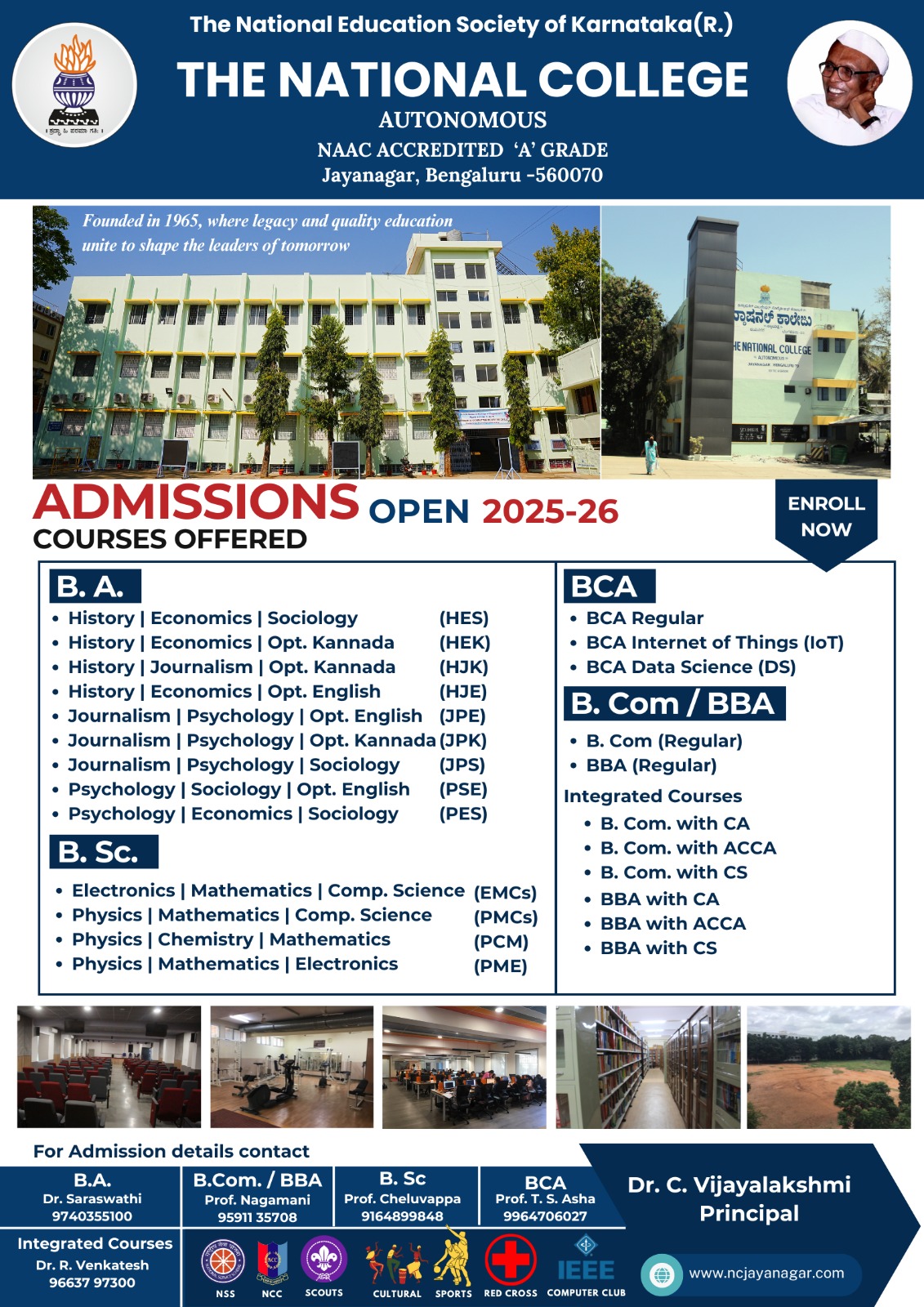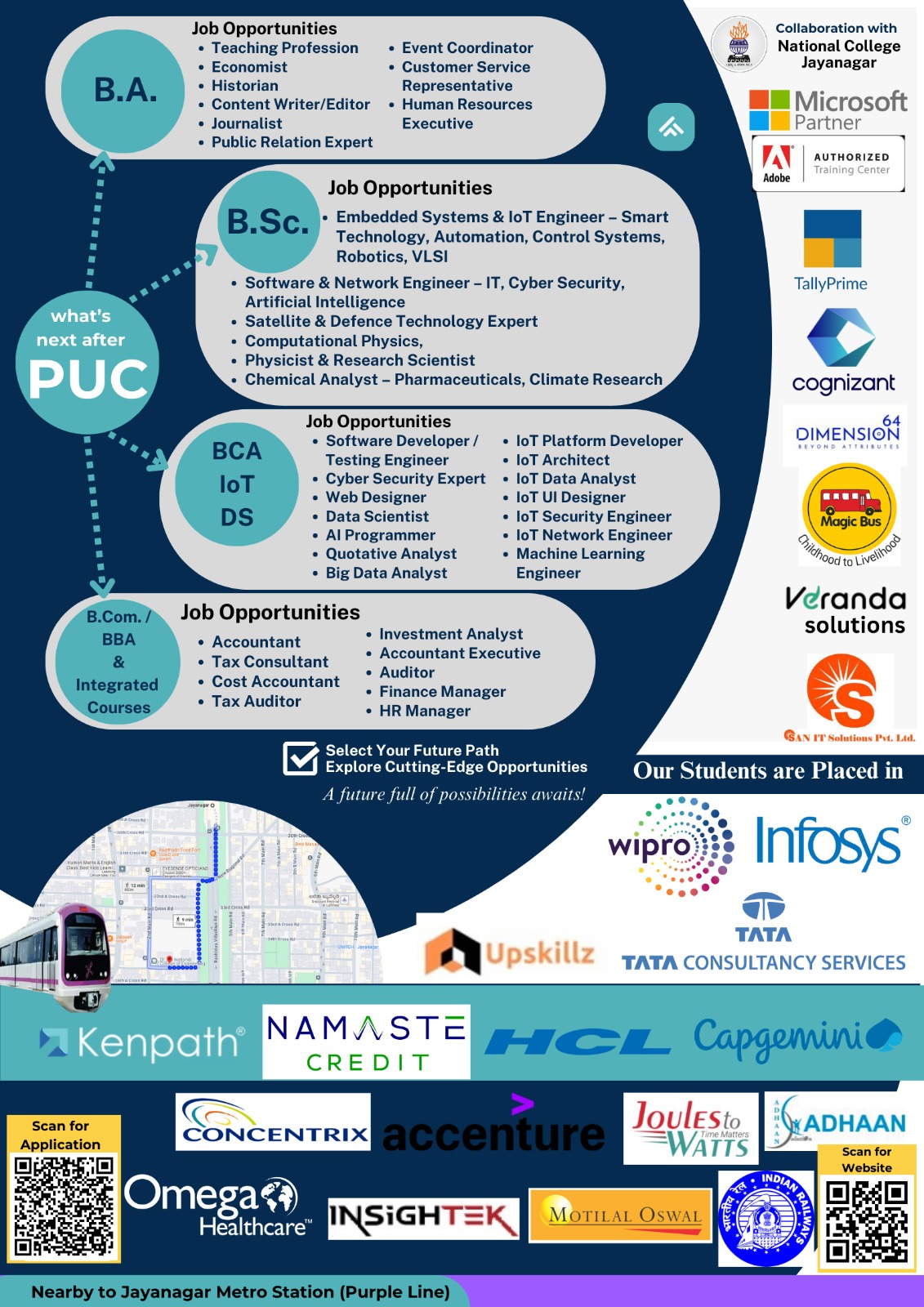Offering New Tech-Based Under Graduate Courses
Approved by AICTE
B.C.A (Internet of Things)
B.C.A (Data Science)
B.Sc. ( Bio-Medical Electronics)
SYNOPSIS OF THREE NEW UNDERGRADUATE COURSES:
The National college ,Jayanagar is introducing three new and unique undergraduate programs from 2019 – 20. The program is designed to build the theoretical fundamentals in the areas of Data Science, Internet of Things and Bio Medical electronics. The coursework has been designed to suit the industry needs. A panel of National college Alumni like Dr. S. Sitharam Iyengar Distinguished University Professor and Director of Florida International University, Miami, Florida, K.S.G Shankar (Former VP & Chief Quality officer, Symphony Services corporation), Phanibhushan Y Sharma(Chief-Coordinator, Education, Research and Technology, NES) MV Bhujanga,Mentor, and Alumni from the Industry and the academic staff of National college have come together to design an exciting curriculum which makes the Students ready for the industry after graduation. The Curriculum builds strong fundamentals in respective subjects, helps the students to apply the theory in practical applications and provides a hands-on approach while learning
On Successful Completion of the Course , Job is Certain since the industry demand in the 3 new areas are growing at a very high rate.
Bio-Medical Electronics:
The 3 year Biomedical electronics undergraduate program prepares the students to develop themselves professionally to meet the current needs in Healthcare technology. Healthcare industry is progressing rapidly with technology. The demand for professionals in this industry segment is projected grow significantly over the years.
During the first two semesters, students learn the fundamentals in Electronics for the embedded technology, They will get hands on experience in handling microcontrollers and acquire programming skills in C and Verilog. They shall also be exposed to managing large data by learning fundamental theory in Mathematics, Statistics and Database management. The data management is an added skill since the future in Healthcare industry involves understanding and analysing of large amount of data.
During the 3rd and 4th semesters students learn 2 streams: (1)Learning the Human anatomy and physiology, sensors and equipment’s used in Bio medical instrumentation which capture the data and Signal processing of the Bio-Medical instrumentation data (2) Data Analytics including data analysis, presentation of the analysed data. Students shall use tools like MATLAB to understand the theory in the laboratory, build projects with ARM controller to learn how to create products for the Healthcare industry using embedded electronics.
The 5th and 6th semesters are focussed on teaching students to apply the skills learnt in the first 4 semesters in practical applications through hardware software integration, Clinical instrumentation and Biomedical nanotechnology. Students shall get the requisite experience valued by the industry, through projects aligned to industry demand and challenges in the 6th Semester.
The 3 year undergraduate program shall enable to students equip themselves with fundamentals needed to succeed in the area of Biomedical instrumentation, Healthcare data analytics and building embedded products for the Biomedical industry.
Internet of Things:
The 3 year Internet of Things (IoT) undergraduate program prepares the students to develop themselves into professional needs of the IoT technology. IoT industry is a fast growing field with devices and applications enabling communication and decision making between devices. Though the program teaches the basics of the technology, it is focused towards the industrial IoT, IoT in automobile industry segment which is fast growing in India. The demand for professionals in this industry segment is projected grow significantly over the years.
During the first two semesters, students learn the fundamentals in Electronics for the embedded technology, They will get hands on experience in handling microcontrollers and acquire programming skills in C and Verilog. They shall also be exposed to managing large data by learning fundamental theory in Mathematics, Statistics and Database management. The data management is an added skill since the future in automobile industry involves understanding and analysing of large amount of data.
During the 3rd and 4th semesters students learn 2 streams: (1)Embedded system design, IoT architecture and protocols, communication fundamentals in IoT technology(2) Data Analytics including data analysis, presentation of the analysed data, Cloud computing . Students shall use tools like RTOS to understand the theory in the laboratory, build projects with ARM controller to learn how to create products for the Automobile industry using embedded electronics and also learn programming Python
The 5th and 6th semesters are focussed on teaching students to apply the skills learnt in the first 4 semesters in practical applications through building products or applications using IoT technology. In addition, students shall be taught state of the art subjects like Mobile communication systems and Software defined networks for IoT. There will be an opportunity for the students to do an Internship for a full semester with some of the leading organisations to get an exposure to the practical need of the Industry.
The 3 year undergraduate program shall enable to students equip themselves with fundamentals needed to succeed in the areas using IoT technology, Automobile data analytics and building embedded products and applications using IoT technology.
Data Science:
The 3 year Data Science undergraduate program prepares the students to develop themselves to pursue a career as Data Scientists. Data science is a multidisciplinary blend of data inference, algorithm development, and technology in order to solve analytically complex problems. Data science is a fast growing field of Science which not only does the exploratory analysis to discover insights from data, but also uses various advanced machine learning algorithms to identify the occurrence of a particular event in the future. A Data Scientist will look at the data from many angles, sometimes angles not known earlier. All domains of business are increasingly moving towards data based predictions increasing the demand of data Scientists across the industry segments.
At the heart of data science is the ability to view the data through a quantitative lens. A data scientist needs strong fundamentals in Mathematics and Statistics. Data Scientist should have the capability to develop algorithms and ability to use structured and unstructured data. The 3 years data science program at National college is a blend of Mathematics and statistics fundamentals, Extracting , managing data from large datasets by developing algorithms and usage of tools to predict and present the conclusions.
During the first 2 semesters, students learn Mathematics and fundamental statistics, Computer organisation , data structures. They shall also be exposed to managing large data by learning fundamental theory in Mathematics, Statistics and Database management. They will also get hands on experience in using tools like Excel and Tableau to apply the theoretical fundamentals of statistics in practical applications.
During the 3rd and 4th Semesters, students learn analysis and design of algorithms, understanding and using unstructured data, extraction and usage of large datasets. They shall learn the prediction methods through fundamentals of machine learning . They shall learn programming in Python to develop applications for data analytics. They shall be exposed top various open source tools popular in the industry in the field of machine learning.
The 5th and 6th semesters are focussed on teaching students to apply the skills learnt in the first 4 semesters in practical applications through building r applications using machine learning . They shall be exposed to advanced topics like deep learning , NLP etc. There will be an opportunity for the students to do an Internship for a full semester with some of the leading organisations to get an exposure to the practical need of the Industry.
The 3 year undergraduate program shall enable to students develop themselves as data scientists and contribute to the industry with sound theoretical fundamentals with practical applications.



